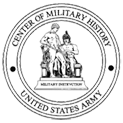
- Home
- Reference Topics
- Ethnic/Women Groups
- Native Americans in the U.S. Army
- Lt Col McClish
[Extracted from OCMH Study 57, Military-Connected Contributions of American Indians to the Culture Heritage of the Nation, Prepared by William Gardner Bell]
Like many of their fellow citizens, Indians have long served in the National Guard and Organized
Reserve units in their respective States. Lt. Col. Edward E. McClish, a Choctaw from Oklahoma and a graduate of Haskell Institute
and Bacone College, was called to, active duty in the National Guard in 1940 and sent to the Philip
pines. In 1941 he commanded a company of Philippine Scouts, then helped mobilize units of the Philippine Army and was commanding
a battalion at the time of Pearl Harbor. Wounded and hospitalized on Mindanao in the early weeks of the fighting, he escaped
capture and went underground to organize a guerrilla force.
By the fall of 1942, McClish had organized and armed some 300 men on Mindanao and consolidated his force with a similar one on
the other side of the island. He then undertook to organize the guerrilla forces in the four eastern provinces of the island into
the 110th Division. The organizational task was complicated by the presence of not only Japanese but of unorganized rival bands
and bandit gangs. Potential soldiers also had to be educated as well ,as trained. By the spring of 1943, McClish had organized
three regiments and part of a fourth, and a division staff had been formed. To overcome a shortage of food and supplies,
agricultural and industrial projects were launched throughout the division zone; vegetables and sugar cane and pigs and poultry
were raised, and sugar, soap, alcohol, and coconut oil were produced.
While Colonel McClish addressed the tasks of organization and administration, his forces fought the Japanese in more than 350
encounters of all sorts-ambushes, raids, patrol actions, assaults on small garrisons. Over a hundred men were killed and many
wounded, while the enemy lost an estimated 3,600 in killed and wounded.
The guerrilla forces eventually made contact with American forces in the South Pacific and supplied information that was highly
useful when invading forces finally returned to the Philippines. Colonel McClish played a personal part in contributing to the
final victory in the Pacific.
For further reading: Indians in the War. U. S. Department of the Interior, Office of Indian Affairs, Chicago, 1945.
